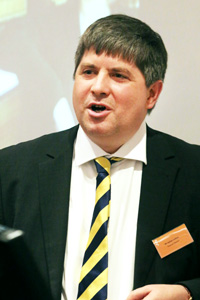
Dr Jochen Leidner
Businesses and organisations need graduates with ‘critical numeracy’ skills in the age of big data - according to Dr Jochen Leidner, Director of Research, Corporate R&D at Thomson Reuters.
Speaking at the launch of the new home of the Institute for Analytics and Data Science (IADS) at the University of Essex, Dr Leidner said he was pleased IADS was taking on the challenge of preparing students for a world where ‘big data’ is transforming professional and consumer decision-making.
He said: “Students need to be prepared to be competent, constructive and critical contributors to such a future. This requires ‘critical numeracy’, which allows critical thinking to be applied to numbers and data, not merely to language arguments.”
He said he was hopeful “well-rounded thinkers” would be produced by IADS, which has moved to dedicated space at Parkside Office Village on the University of Essex’s Knowledge Gateway research and innovation park.
Dr Leidner said students need to have the ability to identify the opportunities and recognise the risks offered by big data combined with other technologies such as artificial intelligence.
He added: “The University of Essex multi-disciplinary approach – its strength in social sciences and law as well as in big data - makes it well positioned for a successful holistic approach to data science and analytics.”
How the Institute for Analytics and Data Science is helping to unlock big data future
In the last four years IADS has secured more than £22m of funding from UK Research Councils, InnovateUK, and the European Union to support analytics and big data projects, infrastructure and knowledge exchange activities
It draws together world-leading experts across a range of disciplines encompassing all aspects of data and analytics from the computer science and engineering, to the social sciences, business, finance and human rights.
The Director of IADS Professor Maria Fasli, who has just been named UNESCO Chair in Analytics and Data Science, said: “Data is only valuable if it is used to make better decisions. We are helping discover the “stories” from data to deliver powerful insights and create new products.
“The technologies and models we are developing and the analyses we are undertaking are not seen in a vacuum. The Essex approach is distinct because we have the expertise to think through the legal and ethical implications arising from analytics and big data. And this allows us to provide frameworks and support for others to follow when utilising big data.”
Developing countries and economies emerging from conflict can benefit from big data
The UNESCO Chair means IADS is working with international collaborators, particularly in developing and transitioning countries, to identify gaps in research skills and knowledge so experts linked to IADS can address them.
She said: “Developing high level knowledge and specialist skills will improve graduates’ employability, up-skill professionals and enable individuals to attain better jobs and improve their lives.
“An injection of skills of this kind, especially in developing and transitioning countries, will help develop strong and self-reliant knowledge economies and support economic growth while also enabling the delivery of better services to citizens and empowering people."